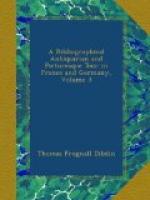We ordered a good fire, and wax candles to be lighted; a chafing dish, filled with live charcoal caused a little cloud of steam to be emitted from a copper kettle—of which the exterior might have been cleaned ... during the last century. But we travelled with our own tea; and enjoyed a succession of cups which seemed to make us “young and lusty as eagles:” and which verified all the pleasing things said in behalf of this philosophical beverage by the incomparable Cowper. Mr. Lewis spent two hours in penning in his drawings; and I brushed up my journal—–opened my map—and catechised the landlord about the MONASTERY of CHREMSMINSTER, which it was resolved to visit on the following (Sunday) morning. Excellent beds (not “sloping in an angle of 45 degrees”—) procured us a comfortable night’s rest. In the morning, we surveyed the lake, the village, and its immediate vicinity. We inspected two churches, and saw a group of women devoutly occupied in prayer by the side of a large tombstone—in a cemetery at a distance from any church. The tombstones in Germany are whimsical enough. Some look like iron cross-bows, others like crosses; some nearly resemble a gibbet; and others a star. They are usually very slender in their structure, and of a height scarcely exceeding four or five feet.
By eleven in the morning, the postboy’s bugle sounded for our departure. The carriage and horses were at the door: the postboy, arrayed in an entirely new scarlet jacket, with a black velvet collar edged with silver lace, the livery of Austria, was mounted upon a strong and lofty steed; and the travellers being comfortably seated, the whip sounded, and off we went, up hill, at a good round cantering pace. A large congregation, which was quitting a church in the vicinity of the inn, gazed at us, as we passed, with looks and gestures as if they had never seen two English travellers before.
The stage from Gmunden to Chremsminster is very long and tedious; but by no means devoid of interest. We halted an hour to rest the horses, about half-way on the route; which I should think was full eight English miles from the place of starting. On leaving Gmunden, and gaining the height of the neighbouring hills, we looked behind, or rather to the right, upon the back part of that chain of hills and rocks which encircle the lake over which we had passed the preceding evening. The sky was charged with large and heavy clouds; and a broad, deep, and as it were stormy, tint of dark purple ... mantled every mountain which we saw—with the exception of our old gigantic friend, of which the summit was buried in the clouds. At a given distance, you form a tolerably good notion of the altitude of mountains; and from this latter view of those in question, I should think that the highest may be about 3000 feet above the level of the lake. It was somewhere upon two o’clock when we caught the first glimpse of the spire and lofty walls of the MONASTERY OF CHREMSMINSTER. This monastery is hid by high ground,—till you get within a mile of the town of Chrems; so called, from a river, of the same name, which washes almost the walls of the monastery.




